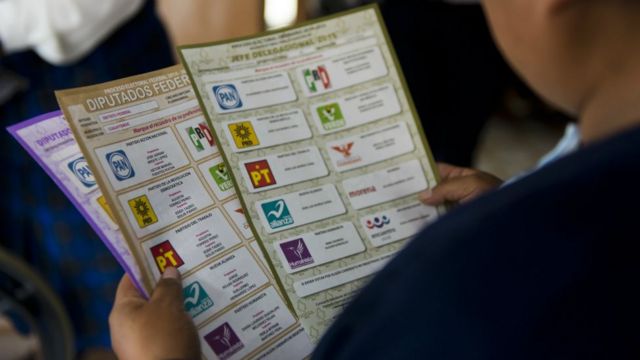Every day, Mexico dawns stained in blood. New acts of corruption involving the president’s family or close associates are uncovered daily. The citizens live in a constant state of anxiety, weariness, and terror, but not the president. For him, everything is fine, and he lives in an alternate reality, far removed from that of the citizenry. The president is campaigning, as he has been throughout his term, while the country is in a state of absolute social decomposition. For López Obrador, there are only two factors, that he used to have in the palms of his hands but are beginning to recede from his reach: his historical legacy, which is marked with blood and fire every day and which the social networks, in particular, “X,” have defined with one word: narco-president. What it began on that social network, has now migrated to others, and positioned itself as a global, unstoppable trend. The other factor is the continuity of what he has called the “fourth transformation.”
“Narco-President”.
López Obrador downplays the expression, but it strikes a chord deep within him. So much so that his government has tried, in every way it can, to discredit the word and trend, but as with quicksand, the harder they try, the deeper they sink. However, it is not the word “narco-president” that should worry him, but a series of actions that speak louder than the word.
First, the state alone has the legitimate monopoly of force. But at the moment, in Mexico, this government has either lost it or decided to give up its monopoly on organized crime, which has established a system of “special taxes” on everything. They have created their sanctions system from mobility, property, wealth, trade, to commerce. Some continue to produce and distribute prohibited drugs, but the criminal business has diversified at the expense of the absence, weakness, and collaboration of state agents. Criminals decide “how much, when, why, and how” to do business through the use of force. Faced with this, the Catholic Church has intervened to try to negotiate with criminals in various parts of the country to achieve a pacification, a “ceasefire” in a country that is drowning in the blood of its dead. How much more will the people put up with being extorted and violated to the point of exhaustion that generates even more violence? How much more will the Mexican Army resist being subjugated, vilified, transformed into bricklayers, customs officers, and police officers, and under the orders of not to fight back nor defend themselves against the onslaught of organized crime? That bomb is already ticking faster and faster.
The “Fourth Transformation.”
The candidate of power Claudia Sheinbaum has registered with the INE (National Institute for Elections). A presidential aspirant who offers continuity in AMLO’s “transformation” and has openly declared that she will not fight organized crime, whose expansion seems unstoppable in almost the entire country in the face of the current government’s indifference, but has declared that she will go against those who use the hashtag “narcocandidata.” She also lashes out at those who demonstrated in the “march for democracy,” whom she called “false and hypocritical” and accused them of being those who “promoted electoral fraud and allowed the buying of votes.”
Dr. Sheinbaum forgets that division generates violence in many forms, and in a world so marked by autocratic leaders, it is best to add, not subtract, and even less to divide. She seems to resent talking of accountability or balances of power. The latter has become evident on several occasions, like when journalists ask Dr. Sheinbaum hard questions. True to the image of President López Obrador, she has also lashed out at social media commentators, media outlets, and reporters in an attempt to undermine their credibility. It seems that discrediting could also be a constant feature of her government should she win the presidency.
Today, Mexicans have a lot to question themselves before they go out to vote in the upcoming elections.
Are they willing to continue with a system of government that has practically wiped out everything that was once functional?
Will they be willing to continue with a system of government that always has “other data”?
Are Mexicans willing to have a president who dislikes pertinent journalistic questions and whose answer to them is: “Why so much violence?
A woman president who continues with a “mañanera” (morning brief) whose only function is propaganda, self-justification, attacking the press and opinions on social networks?
And like these, there are hundreds of other, even more critical questions to be asked.
There are challenging times ahead for Mexicans. Greater polarisation, conflicts, and authoritarian exercises from the presidential power could detonate into tremendous social conflicts, extreme violence, and significant instability in the country, as everything seems to indicate that the president is desperately seeking to set the agenda for the remainder of his administration, but also to control the next one, for which he will seek to establish laws and quotas of power. It was more than clear not only with his legislative initiatives but also with the names in the draw for senators and representatives, which include friends, family members, close collaborators, and propagandists of the Obradorist regime.
Let us hope that López Obrador’s words, “The best… is the worst it will get,” never come true.
For Times Media Mexico
The Yucatan Times
Editorial Board
—
The Yucatan Times editorial board is made up of a group of 9 people from different nationalities and backgrounds, who are selected due to their trajectory and objectivity.


